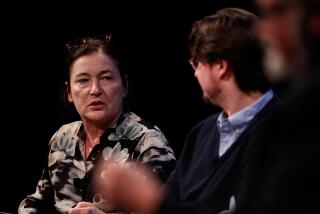A Modern Mephistopheles<i> by Louisa May Alcott; introduction by Octavia Cowan (Bantam Classic: $3.50; 160 pp.) </i> : The Selected Letters of Louisa May Alcott<i> edited by Joel Myerson, Daniel Shealy and Madeleine B. Stern (Little, Brown: $24.95; 315 pp.) </i>
- Share via
“Went for some weeks to the Bellevue and wrote ‘A Modern Mephistopheles,’ ” confided beloved children’s author Louisa May Alcott to her journal in 1877. “It has been simmering since I read Faust last year. Enjoyed doing it, being tired of providing moral pap for the young.”
Not that “A Modern Mephistopheles,” newly issued by Bantam Classics, is anything but profoundly moral: It’s a cautionary tale about the terrible price of temptation, rendered in florid and grandiose prose that brings to mind the tones of a church organ. And Alcott pulled out all the stops on her well-wrought little melodrama: She gives us adultery, betrayal, drugs, seduction, pregnancy, all manner of intrigue, and a heart-rending climax of redemption by reason of tragic death.
Still, readers of “Little Women” and its progeny may be shocked by the thinly veiled eroticism of Alcott’s once-secret novel.
“Mephistopheles” was originally published as part of a series of anonymous novels by famous authors, and Alcott--a self-described “chronic spinster”--allowed herself to explore some of the darker passions in her rendering of the Faust tale. Felix Canaris, a starving young poet, is corrupted with promises of literary success by the Mephistophelean Jasper Helwyze, an elderly benefactor with obscure ulterior motives. Gladys, a plaster saint of a woman, is Helwyze’s unwitting tool in the quasi-seduction of Canaris, whom Helwyze has moved into his own house. Ultimately, Gladys’ shining example of love, faith and sacrifice redeems the wretched young poet and the dissolute old Helwyze, but not before Gladys herself has tasted intellectual and literary pleasures that are made to seem almost pornographic.
Helwyze, impotent and ill, persuades the innocent young girl to read aloud to him “George Sand’s passionate romances, Goethe’s dramatic novels, Hugo and Sue’s lurid word-pictures of suffering and sin; the haunted world of Shakespeare and Dante; the poetry of Byron, Browning and Poe.” Helwyze knows what he is about: “Rich food and strong wine for a girl of 18; and Gladys soon felt the effects. She often paused to question with eager lips, to wipe wet eyes, to protest with indignant warmth, or to shiver with the pleasureable pain of a child who longs, yet dreads, to hear an exciting story to the end. Helwyze . . . enjoyed the rapid unfolding of the woman, and would not deny himself any indulgence of this new whim. . . .”
It is tempting to regard the metaphorical eroticism of “Mephistopheles”--sexual yearning dressed up as literary ambition--as a revelation of Alcott’s own secret passions. By far the most intriguing character in “Mephistopheles”--and, in speech and manner, the most contemporary--is Helwyze, “a wealthy but impotent invalid who can express his sexuality only through his intellect,” as Octavia Cowan writes by way of introduction to the novel. “Alcott’s identification with Helwyze, a manipulative male character who spiritually rapes an ideally feminine woman, underscores her ambivalence toward her own gender.” There is indeed a sexual ambivalence about Helwyze, whose interest in literature seems only partly to explain the intensity of his interest in Canaris.
This perception is reinforced by Alcott’s own letters, which have been thoughtfully selected and usefully annotated by Joel Myerson, Daniel Shealy and Madeleine B. Stern in “The Selected Letters of Louisa May Alcott.” Alcott, a prolific and candid correspondent, readily characterizes herself as a “literary spinster.” Despite her authorship of an enduring classic of literature for young women, she confesses that “I was born with a boy’s nature and always had more sympathy for and interest in them than in girls, and have always fought my fight . . . with a boy’s spirit.”
When she attends a costume ball in the garb of a bearded monk, she reports that “the boys called me ‘sir’ . . . and the girls flirted in earnest till I took off my beard.” And literature takes the place of love, marriage and children; as early as 1854, when her first book, “Flower Fables,” was published, she dubbed it her “firstborn” and asked for her mother’s blessing (“For grandmothers are always kind”).
But Alcott’s craving for literary success was more than a sublimation of her sexual longings. Alcott, the dutiful daughter of the idealistic, influential but mostly impoverished Transcendentalist philosopher Bronson Alcott, turned out to be a hardheaded Yankee entrepreneur, albeit a literary one; as a young woman, newly liberated from her father’s household, she prided herself on putting together a living by sewing and by writing anonymous thrillers for the popular press.
“I am grubbing away as usual,” she wrote to sister Anna in 1854. “I have $11, all my own earnings--$5 for a story, and $4 for the pile of sewing I did for the ladies of Dr. Gray’s society, to give him as a present.”
She reveled in the celebrity that followed the publication of “Little Women,” and especially in its material rewards: “As money is rather a necessary of life, I . . . devote my energies to the earning of filthy lucre.” And in the days before she discovered how to make money out of “moral pap,” she was inclined to write what she readily characterized as “rubbish” because such stories “are better paid than moral and elaborate works of Shakespeare.” And so she warns one publisher: “Don’t be shocked if I send you a paper containing a picture of Indians, pirates, wolves, bears & distressed damsels over a title like . . . The Bath of Blood. A thrilling tale of passion,’ &c.;”
What I found especially intriguing in Alcott’s letters is the rich sense of time and place that she imparts almost in passing. (By contrast, “Mephistopheles” is a stylized Gothic fantasy without any context whatsoever.) Alcott reports on a visit to the family of abolitionist martyr John Brown “where we worshipped at the shrine of John Brown’s grandson, kissing him as if he were a little saint, and feeling highly honored when he sucked our fingers.” When five men from her beloved village of Concord are killed or captured at Bull Run, she complains: “I think they are making a mess of it at Washington.” And she confesses her disenchantment with Dickens after hearing him speak in London: “Youth and comeliness were gone, but the foppishness remained; and the red-faced man, with false teeth, and the voice of a worn-out actor, had his scanty gray hair curled.”
Alcott comes across as a distinctly modern figure, especially in terms of her conception of literature as a tool for celebrity and wealth. Clearly, she was not at all embarrassed by the sexual overtones of “Mephistopheles”; we learn from “Selected Letters” that she encouraged her publisher to put the book back in print toward the end of her life: “Let ‘Modern Mephistopheles’ go alone, with my name, as a summer book. . . .” And the authentic Alcott was hardly frustrated and unfulfilled; rather, she was an assertive and self-actualizing woman, an early and ardent feminist who set out to win fortune and fame and was utterly unsurprised when she did so.
“I think I shall come out all right,” she wrote to her father in 1856, when her rewards were still two decades away, “and prove that though an Alcott I can support myself. I like the independent feeling, and though not an easy life, it is a free one. . . . So I will make a battering-ram of my head and make a way through this rough-and-tumble world.”
More to Read
Sign up for our Book Club newsletter
Get the latest news, events and more from the Los Angeles Times Book Club, and help us get L.A. reading and talking.
You may occasionally receive promotional content from the Los Angeles Times.







